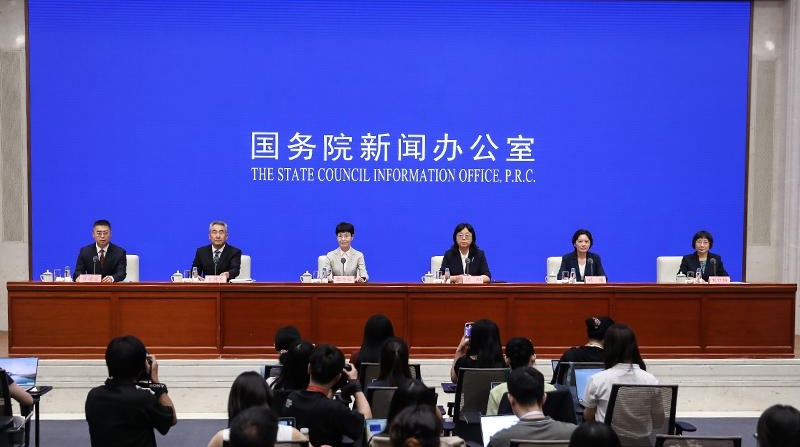CCTV:
As Ms. Guo just mentioned, in October last year, the General Office of the State Council issued measures on accelerating the improvement of the birth support policy system and promoting the establishment of a birth-friendly society. What progress has been made in developing the current birth support policy system? Thank you.
Guo Yanhong:
Thank you for your question. I'll answer this. Last year, the General Office of the State Council issued measures on accelerating the improvement of the birth support policy system and promoting the establishment of a birth-friendly society, which put forward a package of 13 targeted birth support measures in four key areas. The NHC, together with relevant departments, has earnestly implemented these measures, accelerating the effective rollout of the improved birth support policy system and making positive progress.
In terms of financial support, China has introduced multiple measures to reduce the costs of childbirth, childcare and education for families. Expenses for the care of children under 3 years old have been included in the special additional deduction for individual income tax, with the deduction standard raised to 2,000 yuan per child per month. The level of medical expense coverage for childbirth has been improved and the coverage of maternity insurance has been expanded, with maternity benefits now directly given to individuals. These measures have been widely welcomed by the public. In terms of leave support, the maternity leave system has been further improved. Most provinces, autonomous regions and municipalities have extended maternity leave to 158 days or more. In addition, approximately 15 days of paternity leave for spouses and five to 20 days of parental childcare leave have been introduced. In terms of childcare services, the childcare service system has been further improved, with a particular focus on expanding the supply of inclusive childcare services. Efforts have been made to promote integrated childcare and early childhood education services, and to develop various forms of childcare services, such as community-based childcare and employer-provided childcare. By the end of last year, the number of daycare slots nationwide had reached 4.08 per 1,000 people. In terms of maternal and child health services, China has promoted basic medical and health care services throughout the entire childbirth process, expanded the coverage of labor analgesia services, and continued implementing the five key systems for maternal and infant safety. By the end of last year, the country’s maternal mortality rate had declined to 14.3 per 100,000 live births, and the infant mortality rate had dropped to 4.0 per 1,000 live births. These are the best levels ever recorded for China's core maternal and child health indicators, and the World Health Organization (WHO) has recognized China as one of the 10 best-performing countries in this area. To expand pediatric medical services, all secondary and tertiary public general hospitals across the country are required to offer pediatric care to better meet the health care needs of children. In terms of education support, local governments have expanded the supply of high-quality educational resources, thoroughly implemented the "double reduction" policy aimed at effectively easing the excessive homework and off-campus tutoring burden on students in compulsory education, and promoted the balanced development of compulsory education. Recently, an executive meeting of the State Council made arrangements to gradually introduce free preschool education to help ease the financial burden of education on families. Many local governments have introduced policies that allow children from the same family to attend the same school, making it more convenient for parents to drop off and pick up their children. In terms of housing support, local authorities have expanded the supply of affordable rental housing through various channels to help address housing difficulties. In some areas, the maximum housing provident fund loan limit has been raised for families with multiple children. These measures, taken together, have produced tangible results that the public can clearly feel and benefit from.
Next, the NHC will work with relevant departments to ensure the effective implementation of existing policies. At the same time, it will strengthen forward-looking research and policy reserves, continuously enrich and improve the toolbox of birth support policies, further ease the burden on families related to childbirth, parenting and education, and promote the development of a birth-friendly society. Thank you.


 Share:
Share: 




 京公网安备 11010802027341号
京公网安备 11010802027341号